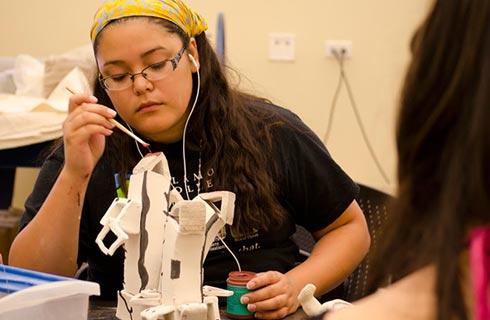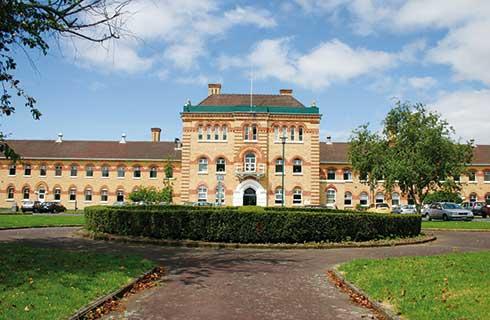国际学生入学条件
Applicants admitted to the PhD Program must already hold a Master's degree and will normally have completed the requirements for the Master of Architecture, Master of Planning, Master of Landscape Architecture, Master of Geography, or a related program. Students from allied fields are also encouraged to apply, and field specialization and background are open.
Admission to the PhD in Geography, Planning, and Design program is competitive and based on merit. We do not admit students directly into research groups; all prospective students go through a single application process. If your background and qualifications are a good fit to the current needs and interests of the program’s faculty, they may accept you with funding from one of their research projects. In your statement of interest, please be sure to describe your research interests and skills, as they will be important for determining whether you receive an offer of admission. GRE scores are not required for admission.
Three Letters of Recommendation: You will submit the contact information in your application for three instructors or other professionals who can attest to your potential for our PhD program. They will receive an email from CU Denver with a link to upload their letters directly to your application.
Examples of previous research and written works
Transcript(s): International transcripts: An International Credential Evaluation Report is required for any applicant who attended one or more academic institution(s) located outside the United States. All international credentials from the academic institution(s) located outside the United States will need to be verified for authenticity and evaluated by CU Denver or an external evaluation provider (ECE or WES).
Statement of Personal and Professional Goals (Statement of Purpose)
An official conferred degree transcript is required by the university.
Academic achievement as evidenced by an undergraduate grade point average of 3.0 (on a 4.0 scale) or better, and a graduate grade point average of 3.5 or better.
Applicants whose native language is not English must take either the Test of English as a Foreign Language (TOEFL) or the International English Language Testing System (IELTS) exam, or have a graduate degree from a university in the U.S. or another English-speaking country. The minimum TOEFL score required for acceptance by the University of Colorado at Denver is 80 or higher on the TOEFL (sub-scores of 20 in Reading, Listening, and Speaking, and 24 in Writing) or 6.5 on the IELTS (sub-scores of 5.5 in each area). However, the Ph.D. program typically does not accept a student with a score lower than 85 on the TOEFL and 6.8 on the IELTS.
展开
IDP—雅思考试联合主办方

雅思考试总分
6.5
- 雅思总分:6.5
- 托福网考总分:79
- 托福笔试总分:160
- 其他语言考试:PTE ACADEMIC - 58 (Reading 42 Listening 42 Speaking 42 Writing 42)
CRICOS代码:
申请截止日期: 请与IDP联系 以获取详细信息。
课程简介
The College of Architecture and Planning offers one doctoral program: PhD in Geography, Planning, and Design. This research-oriented degree is also the only doctoral program in planning, architecture, or landscape architecture in the state of Colorado. Since 1997, the program has trained students to become high-impact faculty members, professionals, and intellectual leaders in fields that address urgent social and environmental issues. Our unique, interdisciplinary degree prepares students to be critical thinkers, engaged scholars, and innovative researchers capable of addressing complex and emergent issues. Our students explore interactions between society and the built and natural environment and engage in research aimed at promoting sustainable, healthy, and socially just communities at local, regional, and global scales. (See below our four Areas of Emphasis.) By integrating the fields of Geography, Planning, and Design, our doctoral students receive an innovative educational experience that enables cutting-edge research and professional contributions. Solving critical urban and environmental problems in the 21st century requires that we move beyond traditional academic silos and modes of knowledge production.<br>The program is committed to developing and implementing efficient and effective processes of assessment and evaluation to advance student learning, teaching effectiveness, and program quality. The program's five student learning outcomes provide the faculty and students with a shared understanding of the goals directing the curriculum.<br>To protect our natural resources, promote healthy and safe communities, and improve the communication of environmental knowledge, our students and faculty examine diverse social-environmental relationships in built and natural settings. Within this area of emphasis, our courses and projects utilize insights from fields such as human-environment geography, landscape architecture, environmental planning, and physical geography.
展开







 预科
预科 奖学金
奖学金 实习机会
实习机会 在校学习
在校学习 跨境学习
跨境学习 校园授课-线上开始
校园授课-线上开始 在线/远程学习
在线/远程学习


 滑铁卢大学
滑铁卢大学

 滑铁卢大学
滑铁卢大学

 达尔豪斯大学
达尔豪斯大学

 达尔豪斯大学
达尔豪斯大学

 多伦多都会大学
多伦多都会大学

 曼尼托巴大学
曼尼托巴大学









 美国
美国





